
Полная версия:
On The War In Africa
37.
The same news had also been announced to Curione, but he found it hard to believe it, and for a time he ignored it, trusting in his good fortune. Curione trusted in the fact that for some time now many letters had been told of Caesar's successes in Spain; therefore he believed that King Juba would not dare to take military action against him. But when he learned from reliable sources that King Juba was less than 25 miles (37 kilometres) away, he abandoned the siege works and took refuge in Cornelius' camp. Here he immediately began to gather wheat and timber, fortify the camp and immediately sent orders to Sicily to send him two more legions and the rest of the cavalry. The place was definitely suitable for waging an all-out war, first of all because of the nature of the place and the way it had been fortified, but also because of its proximity to the sea and the abundance of water and salt that had been brought in large quantities from the nearby salt pans. There was also no lack of timber, provided by the great quantity of trees around, and the wheat with which the fields were full; so Curion, with the consent of all his people, was preparing to wait for the troops he had requested and to drag the war along.
38.
After making this decision he respected this plan of action, but then Curione discovered from some deserters from the city that King Juba had stopped in his kingdom to fight a war with a neighbouring people and to settle some quarrels with the inhabitants of Leptis; only one of his prefects, Saburra, was with a few troops near Utica. Curione, believing recklessly in these sources, changed his plans: he decided to resolve the matter by fighting. In taking these intentions certainly influenced his young age, his great courage, the successes of the previous days and finally the hope of completing the task assigned to him.
Moved by these thoughts, as night fell, he sent all his cavalry against the enemy camp that was located near the Bagrada river. The commander of the camp was that Saburra just mentioned above, but Curione did not know that King Juba was following his prefect and had stopped only 6 miles (9 kilometres). The knights of Curione made that journey at night and swooped unexpectedly onto the Numidians who, following one of their barbaric customs, had laid here and there in disorderly fashion. Assaulted in their sleep, a great number were killed while the others fled in terror. After carrying out this action, the cavalry returned to Curione, leading prisoners there as well.
39.
Caio Curione had left the camp before it was daylight with all the militia, leaving five cohorts at the camp. After advancing for about 6 miles (9 km), he met his cavalry on his way back from the enterprise that briefed him about it; then he asked the prisoners to tell him who was in charge of the camp at Bagrada. They answered him "Saburra". In his haste to end the journey, he failed to ask the prisoners for further information and, addressing the nearest soldiers, said: "Soldiers, do you see that the words of the prisoners coincide with those of the deserters? The king is far away; he has sent only a few troops that have not even withstood the attack of a few knights, so hurry to your prey, to glory, so that I may as soon as possible already think of your rewards and show you my gratitude. The feat of the knights was truly remarkable, especially when one compares their small number to the multitude of enemies, but as often happens the protagonists themselves remembered that action with too much emphasis and exaggeration, as men often do when speaking of their own merits. In addition to the tales, the mortal remains were displayed and the prisoners exhibited, so that any further delay seemed to be a delay towards victory; so it was that, to Curione's hopes, the soldiers' ardour was added. Curione ordered the cavalry to follow him and then accelerate the march to catch the enemies still terrified and dismayed; but the cavalry, exhausted by the march that lasted all night, could not keep pace and stopped here and there with the men scattered, but even this did not diminish Curione's hopes.
40.
King Juba, informed by Saburra of what had happened during the night, sent him 2000 Gallic and Hispanic knights he normally kept as his bodyguard and that part of his infantry on which he relied most. He himself, along with the rest of the militia and 60 elephants, followed them, albeit at a slower pace. Saburra, trusting in the fact that the Curione himself was approaching as he had sent the cavalry ahead, deployed infantrymen and knights, ordering them to retreat little by little and to pretend fear in retreating: he would give the signal to fight at the most opportune moment and when necessary.
And in fact Curione made the armies descend from the heights to the plain, because in his mind he was even more convinced that the enemies wanted to retreat, an impression that added to the previous ones.
41.
Curione, after having already descended a long way from the heights, since the army had already covered 16 miles (24 kilometres) and was exhausted, decided to stop. Saburra, seeing the move of the Roman, gave the signal to his army, deployed it in battle order and, wandering among his own, urged them to fight; he also kept the infantry in the second line as if he wanted to intimidate with the number, leaving the task to attack his cavalry.
Curione did not fail in his duties as commander and exhorted his men to value every hope of salvation; even the soldiers did not fail in their duty: though tired, the knights, though few remained, did not fail in zeal. And there were a total of 200 of them left, because the others had marched on because they were tired... These very knights went everywhere to attack, forcing their enemies to retreat, but they did not have the strength to chase them, nor could they ask their horses for any more enthusiasm. But the cavalry already managed to surround our ranks on both sides and attack us from behind. Whenever the cohorts attempted a counterattack and disengaged from the ranks, they were isolated, because the Numidians, fresher, immediately avoided contact; when ours tried to return, they were prevented from doing so by their enemies. For this reason there was no security in maintaining position or deployment, nor in trying their luck with an attack. In addition, the enemy ranks continued to increase thanks to the constant contingents sent by King Juba, while our troops were becoming less and less tired, and the wounded could not even leave the line or take refuge in a safe place, since the whole army was now surrounded and held in a vice by the enemy cavalry. Ours desperate to be saved and everyone (as the dying usually do) recommended themselves to their dead relatives, praying that some of them could escape from that danger; fear and panic were everywhere.
42.
Curione understood that his men no longer listened to his exhortations, not even when he begged them to do so, because they were all gripped by terror; given the disastrous situation, he confided that there was only one way of salvation: he ordered all his men to occupy the nearby hills and bring the insignia, but the way was closed to them by the cavalry sent by Saburra, who had occupied them before ours. At this point our people reached the maximum degree of despair; some of them, seeking escape, were killed by the enemy cavalry, others fell to the ground exhausted even though they were not wounded. Gnaeus Domitius, the commander of Curione's cavalry, taking sides around him with a few men, urged him to seek escape and return to the camp, promising not to abandon him. But Curione declared that he would never return to Caesar after he had lost the army he had confidently entrusted to him, and so he chose to die fighting. Only a very few knights were saved from battle, but the others who had stopped in the rearguard to rest, noticing what was happening and the escape of the whole army, managed to return unharmed to the camp, while the infantrymen, from the first to the last man, were all killed.
43.
Having become aware of these facts, Quaestor Marcio Ruffo - who had been left by Curione at Camp Cornelius - urged the soldiers not to lose heart, but they continued to beg him to take them back to Sicily with their ships. Marcio Ruffo promised to do so and gave orders to the commanders of the ships to keep, at the end of the evening, the spears anchored at the lido. The terror of all was so great that everyone spread unfounded things: there were those who said that King Juba's troops were now close by, others claimed that Azzio Varo's legions were already on them and even saw the dust (and yet nothing was happening at all), still others believed that the enemy fleet was coming fast. So, because they were all shaken by fear, it was every man for himself: those on the warships speeded up their departure, and the flight of the warships instigated the commanders of the cargo ships, so that only a few, small boats gathered to perform the task assigned to them. On the shore, there was a crowd to gain a place on the boats; so many sank because they were overweight, while others struggled to approach the shore for fear of following their fate.
44.
For these reasons, only a few soldiers - mostly family fathers - who proved to be influential by authority or pity on the part of others were able to embark; others were able to swim to the ships and thus reach Sicily safely.
The other troops chose to send centurions to Publio Azzio Varo as ambassadors at night and surrendered themselves to him, but the next day King Juba, arriving with his troops and seeing those cohorts in front of the city, publicly declared that he considered them his prey of war and ordered that many of them be killed immediately; the others, those personally chosen by Juba, were sent to his kingdom. Although Azzio Varo complained that this act offended his loyalty, he dared not oppose the will of the Numida king. Juba himself, who entered the city on horseback, followed by several senators - including Servio Sulpicio and Licino Damasippo - in a few days established and ordered what he wanted done in Utica, and after a few days, with all his soldiers, returned to his kingdom.
DE BELLO AFRICO
On the ear in Africa
Gaius Jiulius Caesar
Latin text
MAPS
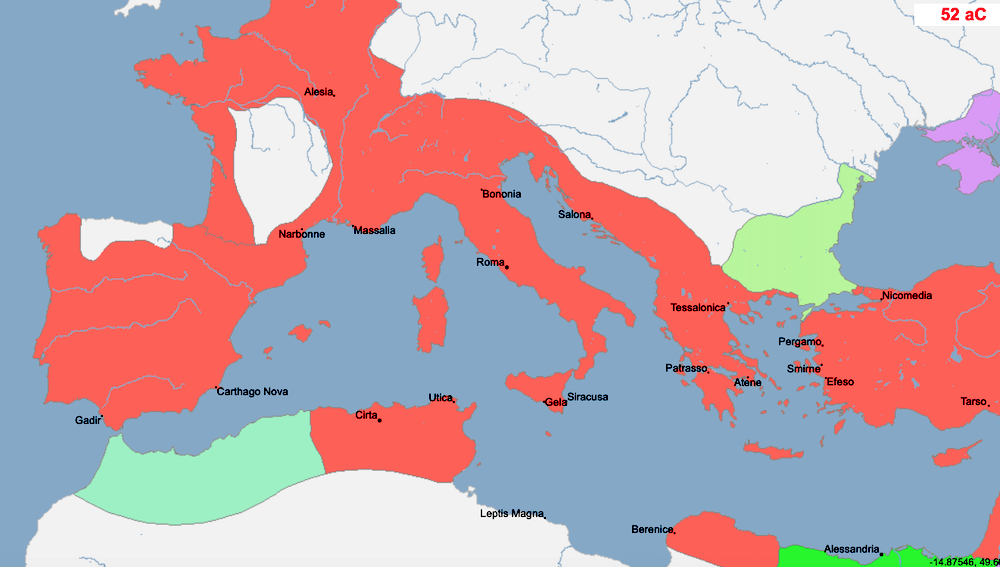
year 52 BC
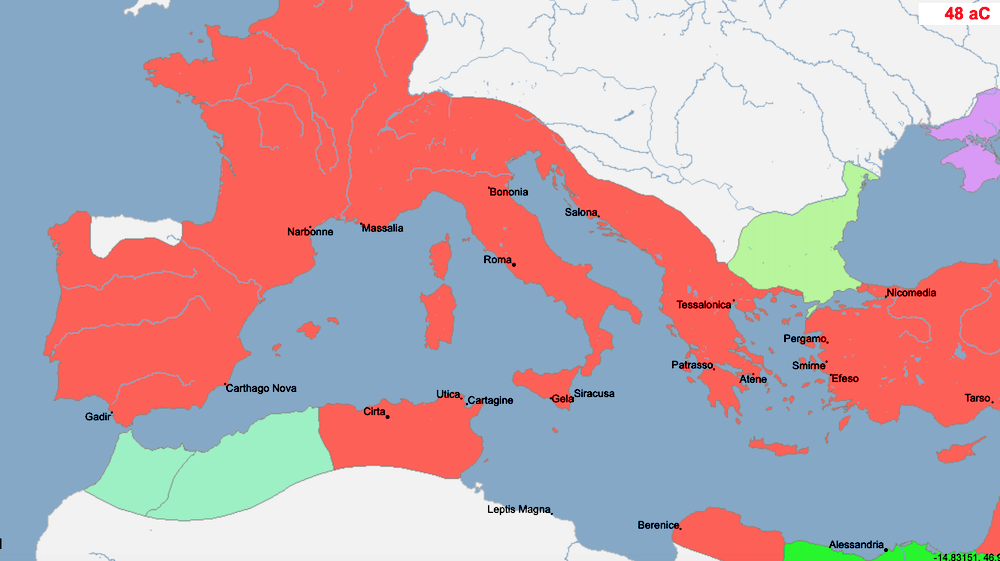
Year 50 BC

Year 48 BC
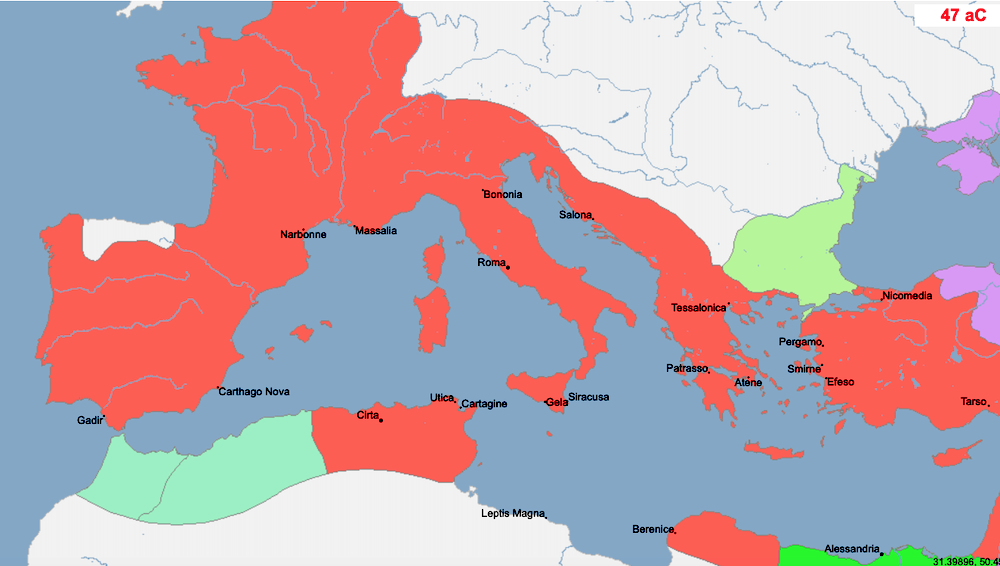
Year 47 BC
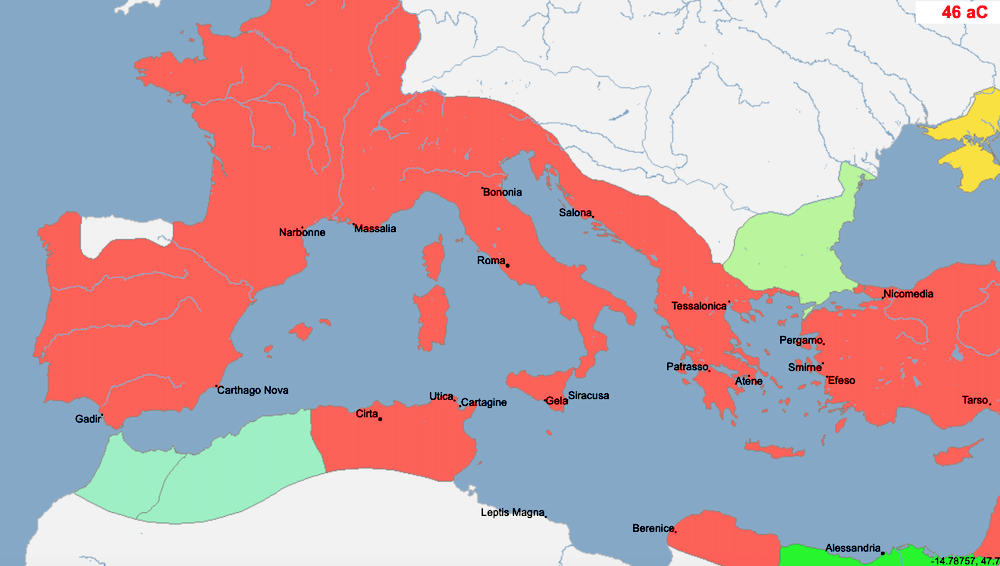
Year 46 BC
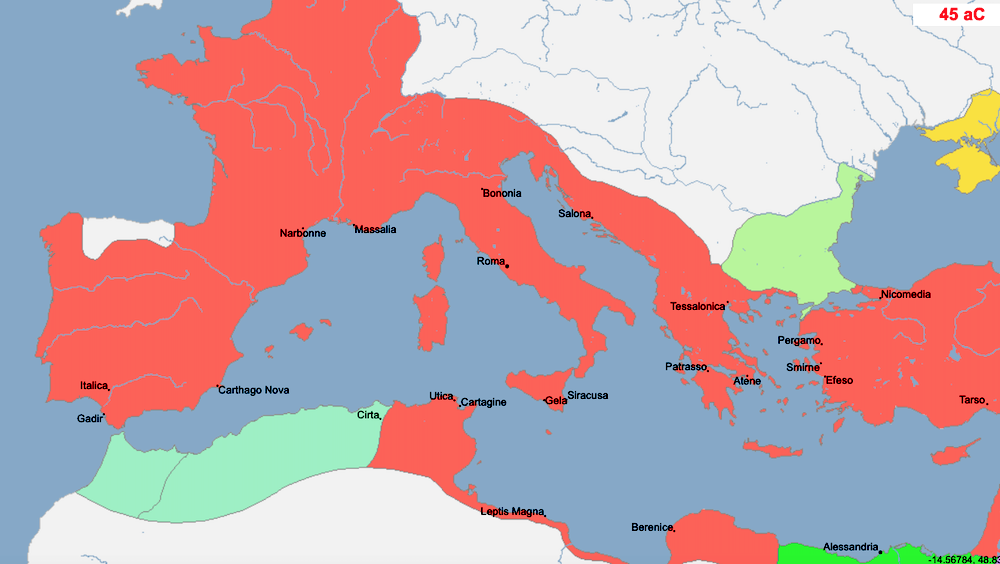
Year 45 BC
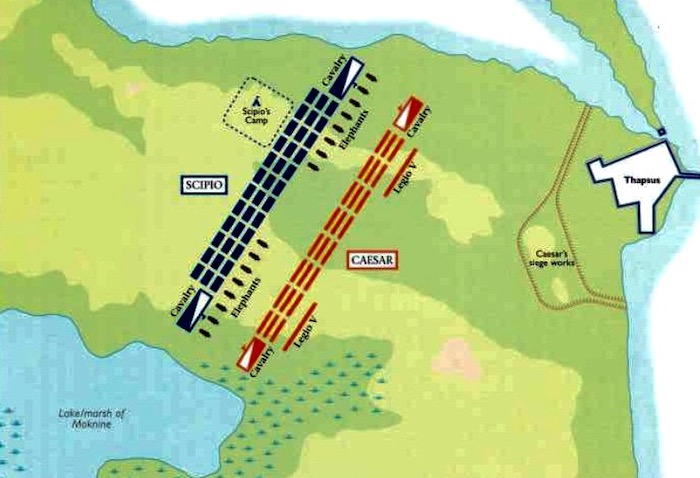
Battle of Tapso
NOTES
DBG = De Bello Gallico
DBC = De Bello Civili
DBC AL = De Bello Alexandrino
DBC AF = De Bello Africo
DBC HI = De Bello Hispanico
Characters
A
Achilla - Achillan (Egyptian)
- DBC L3 Chapters 104, 108, 109, 110, 111, 112,
- DBC AL Chap. 4, 26,
- Egyptian General of the first century BC, said by Caesar to be capable and in command of a well-prepared army. Before the outbreak of the war Alexandria, the general was engaged in Pelusio against Cleopatra's militia, after the killing of Pompey and the arrival of Caesar in Egypt will move all troops to Alexandria putting the Roman general in considerable difficulty.
- https://it.wikipedia.org/wiki/Achilla
M. Acilio - M. Acilio (Cesarian)
- DBC L3 Cap 15
- Cesarian Officer
- Not found
- http://www.treccani.it/enciclopedia/manio-acilio-glabrione/
- https://www.romanoimpero.com/2018/09/marco-acilio-glabrione.html
Lucius Afranius - Lucius Afranius (Pompeian)
- DBC L1 Cap. 37 to 53, 59 to 76, 83 to 87,
- DBC L2 Chap. 17, 18,
- DBC L3 Chap. 83, 88,
- DBC AF Cap 64, 69, 95,
- DBC HI Cap. 7,
- He was a politician and a Roman general no much loved by the Senate but always loyal to Pompey. He was active in the third war against Mithridates but with poor performance. He was elected Consul in 60 B.C. thanks to Pompey's support but he didn't meet the expectations. He was later Governor in Spain with 3 legions and in 49 BC he faced Caesar. Defeated and pardoned he returned to fight Caesar both in Farsalo and in Africa where he was defeated and executed again.
- https://it.wikipedia.org/wiki/Lucio_Afranio_(console_60_a.C.)
Alianus - Alienus - Governor of Sicily in 46 BC.
- DBC AF Chap. 2, 34, 44,
- Governor of Sicily in charge of continuing preparations to bring in the new legions.
- Not found
Androstene - Praetor of Thessaly
DBC L3 Cap 80,
Not found
Titus Ampius Balbo Titus Ampius Balbus (Pompeian)
- DBC L3 Cap 105,
- He was a Roman politician, at the outbreak of the civil war he sided with Pompey, was then pardoned by Caesar.
- https://it.wikipedia.org/wiki/Tito_Ampio_Balbo
Gaius Antonio - C. Antonio (?)
- DBC L3 Chap. 67,
- Roman military.
- Not found
Antonio? (Not identifiable with certainty)
- DBC HI Cap 17, 18,
- He seems to be a well-known person but the text does not specify who he is.
- Not found
Mark Antony - Marcus Antonius (Caesarian)
- DBC L1 Chapters 2, 11, 18,
- DBC L2 Cap. -
- DBC L3 Chapters 4, 10, 24, 26, 29, 30, 34, 40, 46, 65, 89,
- He was a Roman politician and general at the turn of the first century BC. His career remained linked to that of Julius Caesar of whom he was an important lieutenant. In addition to the civil war that opposed Caesar to Pompey, there is his personal story that saw him as the protagonist immediately after the assassination of Caesar with the brief war of Mutina (Modena), the Second Triunvirate followed by a new clash between the Romans. After the elimination of the Caesaricides and the division of the provinces, contrasts arose between the Triunvirates that soon led to the final clash with Octavian. He was the first politician who suffered the cancellation of his name and his effigy from all official acts of the Roman Republic. His political and human story is very interesting and not yet fully understood because of the aura of romanticism that envelops his turbulent relationship with Cleopatra. On Mark Antony and his descendants one can well notice the unjust and moral way of Augustus' government, characteristic before the de facto dictatorships, even if they were not concomitant. Another curiosity is linked to the use of defining a Marcantonio, men with an imposing appearance, which derives precisely from the physical appearance of Mark Antony.
- https://it.wikipedia.org/wiki/Marco_Antonio
D. Eagle (Caesarian)
- DBC AF Caps. 62, 63, 67,
- Roman Military
- Not found
M. Aquinas (Pompeian)
- DBC AF Cap 57, 89,
- Roman Military
- Not found
Clodio Arquetio - Clodio Arguetius (Caesarian)
- FBC HI Cap 10, 23,
- Caesar's lieutenant
- Not found
Ariarate X (10) - Ariarathi X - King of Cappadocia
- DBC AL Cap. 66,
- Maybe it's Ariarate X (10) from Cappadocia
- https://it.wikipedia.org/wiki/Ariarate_X_di_Cappadocia
Ariobarzane II (2) Eusebius (Roman ally)
- DBC AL Chap. 34, 66,
- King of Cappadocia who reigned for a few years.
- https://it.wikipedia.org/wiki/Ariobarzane_II_di_Cappadocia
Ariobarzane III (3) Eusebius - Ariobarzanis (Roman ally)
- DBC L3 Chap. 4,
- DBC AL Cap. 34,
- King of Cappadocia of the first century B.C.
- https://it.wikipedia.org/wiki/Ariobarzane_III_di_Cappadocia
Arsinoe IV (the fourth) Egyptian Princess
- DBC L3 Cap. 112,
- DBC AL Chap. 4, 33,
- Egyptian Princess, Cleopatra's younger sister who in her youth challenged Caesar by actively participating in the Alexandrine War through her advisor Ganymede who gave the Roman general a hard time. She ended up exiled to Antioch and later killed probably on the orders of the couple Mark Antony, Cleopatra.
- https://it.wikipedia.org/wiki/Arsinoe_IV
Lucio Nonio Asprenate - Asprenas (Cesarian)
- DBC AF Cap 80,
- DBC HI Cap. 10,
- Roman praetor
- https://it.wikipedia.org/w/index.php?title=Lucio_Nonio_Asprenate_(console_36_a.C.)&action=edit&redlink=1
C. Atheist C. Atheiuis (Pompeian)
- DBC AF Cap. 89,
- Roman Citizen
- Not found
P. Atrium P. Atrius (Pompeian)
- DBC AF Cap 68, 89,
- Roman Military
- Not found
C. Avienus (Caesarian)
- DBC AF Cap 54,
- Military Tribune of the Tenth Legion
- Not found
B
Luceio Balbo (Cesariano)
- DBC L3 Chap. 19,
- Not found
A. Bebio - A. Baebius (Knight of Asti)
- DBC HI Cap. 26,
- Roman Knight of the city of Asti, Piedmont, Italy
- Not found
Marcus Calpurnio Bibulus - Marcus Calpurnius Bibulus (Pompeian)
- DBC L3 Chap. 5, 7. 8, 14, 15, 18, 110
- He was one of the main opponents of Julius Caesar with whom he found himself sharing the Consulate but without being able to take away his visibility and operational capacity. Supported by Marcus Porcius Cato, he was able to hold other public offices including a governorate of Syria, when he returned he was in the middle of the civil war between Caesar and Pompey. Placed in command of the Adriatic fleet, he made a serious tactical error that would allow Caesar to reach the other coast. Having learned his lesson, he blocked all the Adriatic ports to prevent the arrival of further supplies but in 48 BC he fell ill and died at Corfu.
- https://it.m.wikipedia.org/wiki/Marco_Calpurnio_Bibulo
Bagud or Bogus, Bogos, Bogud, Bochus - King of Mauritania (Ally of Caesar)
- DBC AL Cap. 59, 60, 62,
- DBC AF Cap 23, 25,
- He is a king of Mauritania allied with Julius Caesar in the war against Pompey. He did not have very important roles in the first part of the civil war, in De Bello Alessandrino he intervened in the dispute between Cassius and Marcellus in a questionable way, while in 45 B.C. in Munda he was decisive in provoking the disbandment of Pompey's son's army.
- https://it.wikipedia.org/wiki/Bogud
Tenth Junius Brutus Albinus - Decimus Iunius Brutus Albinus (Caesarian)
- DBC L1 Chap. 36, 56, 57,
- DBC L2 Chapters 3, 5, 6, 22,
- He is one of the most famous characters in history, his fame is closely linked to the murder of Julius Caesar and to a sentence pronounced by Caesar at the point of death. Brutus closely followed Julius Caesar's career, he was with him in Gaul and in the first two years of the civil war, particularly in the siege of Marseilles. Later he moved away a little bit from the flattery of the Senators belonging to the party against Caesar, this because Brutus was the descendant of a very important Roman family that had played a very important role in the passage from the monarchy to the Republic, That's why the conspirators thought it important that he was also at the Ides of March. He would later face the Second Triunvirate and be one of the four protagonists of the battle of Philippi. He is a very complex figure both from a historical and psychological point of view, one can assume that he found himself squeezed between characters capable of manipulating many people.
- https://it.wikipedia.org/wiki/Decimo_Giunio_Bruto_Albino
C
Quintus Fufio Calenus - Quintus Fufius Calenus (Caesarian)
- DBC L1 Chapter 87,
- DBC L3 Chapters 8, 14, 26, 56, 106,
- DBC AL Chap. 44,
- He was a Roman politician and soldier of the first century B.C. always close to Caesar's positions, he took part both in the war in Spain in 49 B.C. and in the Alexandrine War, he played a fairly important role in the Aegean Sea but did not take part in the Battle of Farsalo. Following Caesar's death he sided with Mark Antony but died before the final battle.
- https://it.wikipedia.org/wiki/Quinto_Fufio_Caleno
Marco Calidio - M. Calidius - Marcus Calidius (politician)
- DBC L1 Cap. 2,
- Probably a Roman senator, held some public office...
- https://it.wikipedia.org/wiki/Marco_Calidio
Cneo Domitius Calvinus - C. Domitius Calvinus - Gnaeus Domitius Calvinus (Caesarian)
- DBC L3 Chapters 34 through 38, 78, 79, 89,
- DBC AL Chap. 9, 34 to 42, 65, 69, 74,
- DBC AF Cap 86, 93,
Конец ознакомительного фрагмента.
Текст предоставлен ООО «ЛитРес».
Прочитайте эту книгу целиком, купив полную легальную версию на ЛитРес.
Безопасно оплатить книгу можно банковской картой Visa, MasterCard, Maestro, со счета мобильного телефона, с платежного терминала, в салоне МТС или Связной, через PayPal, WebMoney, Яндекс.Деньги, QIWI Кошелек, бонусными картами или другим удобным Вам способом.
Вы ознакомились с фрагментом книги.
Для бесплатного чтения открыта только часть текста.
Приобретайте полный текст книги у нашего партнера:
Полная версия книги
Всего 10 форматов



